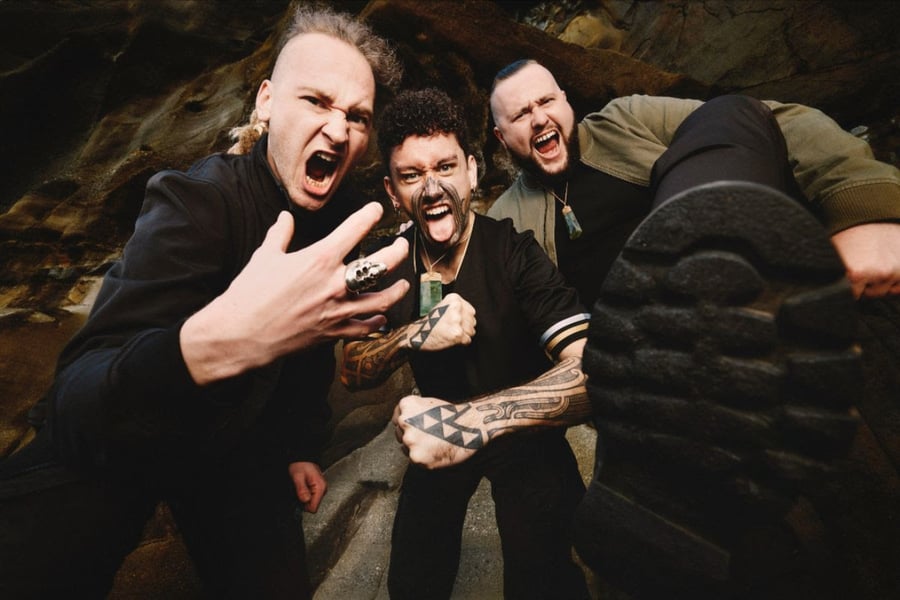Alien Weaponry have always been more than just a metal band. Since exploding onto the international stage with their breakout 2018 debut Tū, the trio of young Māori musicians from Aotearoa have carried an ancestral fire into the mosh pit, merging face-melting riffs with a fierce cultural pride rarely seen in the global heavy music landscape.
Now, with the release of their third studio album Te Rā, the band takes another monumental step forward—both musically and thematically—delivering their most ambitious and explosive record yet.
Produced and mixed by veteran metal producer Josh Wilbur (Lamb of God, Gojira, Megadeth), Te Rā marks a defining moment for Alien Weaponry: a powerful blend of thrash, groove, nu, and death metal that’s as technically sharp as it is emotionally and politically charged.
Te Rā arrives with a thunderous statement of intent in the form of new single “Taniwha”, a pulverising, death-metal-leaning anthem featuring none other than Lamb of God frontman Randy Blythe. The collaboration is a full-circle moment for the band, who have long cited Blythe’s group as a formative influence.
“Lamb of God played a significant role in making Alien Weaponry what it is today,” the band shared in a statement. “This collaboration with Randy Blythe feels like one of those ‘pinch yourself’ moments that our teenage selves would never believe possible. Randy’s lyricism and vocal expertise was an amazing addition to this song and we are beyond stoked to share this song/milestone with the world.”
“Taniwha” isn’t just heavy in sound—it’s heavy in spirit. Like much of Te Rā, the song draws from deep within te ao Māori (the Māori worldview), channelling mythical and historical themes through the lens of modern metal. And while the band have built their reputation on honouring their cultural heritage, this time they’re pushing harder, going deeper and darker than ever before.
Lyrically, Te Rā is drenched in a potent mixture of anger, frustration, reverence, and resistance. There’s a noticeable shift toward despondency and existential weight, especially in frontman/guitarist Lewis Raharuhi de Jong’s English-language lyrics. Tracks like “Crown” and “Hanging by a Thread” explore personal and social disenfranchisement, placing listeners directly in the headspace of those fighting to be heard in a world that often refuses to listen.
Love Music?
Get your daily dose of everything happening in Australian/New Zealand music and globally.
On “Blackened Sky” and “1000 Friends,” Lewis turns his gaze outward, confronting some of the most pressing global anxieties of the modern era: the threat of war, the numbing effect of hyperconnectivity, and the toxic influence of social media. The songs are brutal—not just in sound, but in the truths they tell.
Meanwhile, bassist Tūranga Porowini Morgan-Edmonds takes the reins on a number of tracks with lyrics delivered in te reo Māori, drawing on ancient history, battle lore, and mythology. Songs like “Tama-nui-te-rā” and “Ponaturi” bring a cinematic intensity to their storytelling, with pounding drums and tightly coiled riffs underscoring tales of gods, monsters, and ancestral warfare.
Album closer “Te Kore” takes a meditative turn, exploring the primordial void at the root of the Māori creation story. It’s a moment of sonic stillness in an otherwise relentless album—one that adds philosophical weight and a sense of cosmic scope. By contrast, “Mau Moko” deals with the visible and immediate: the traditional Māori practice of moko (facial tattooing). Here, the band reflects on the pride and pain of cultural identity, acknowledging the social cost of maintaining customs that challenge colonial expectations.
What makes Te Rā such a landmark for Alien Weaponry isn’t just the scale of its ambition, but the way it captures the tension between worlds—between past and present, tradition and rebellion, spiritual belief and societal decay. It’s an album rooted in whakapapa (genealogy) but aimed squarely at the fractured realities of today.
Musically, the band has never sounded more dialled in. Wilbur’s production elevates every breakdown, every riff, every throat-shredding scream to a new level. Guitar work is tighter and more experimental, drumming more intricate, vocals more dynamic. It’s a sound that has matured, evolved, and hardened—still recognisably Alien Weaponry, but bolder, sharper, and more defiant than ever before.
From the depths of Māori mythology to the chaos of the modern world, Te Rā is a battle cry, a lament, and a call to arms. It’s an unflinching examination of identity, oppression, and survival—and it might just be one of the most important metal albums of the year.
Te Rā is out now via Napalm Records.



































